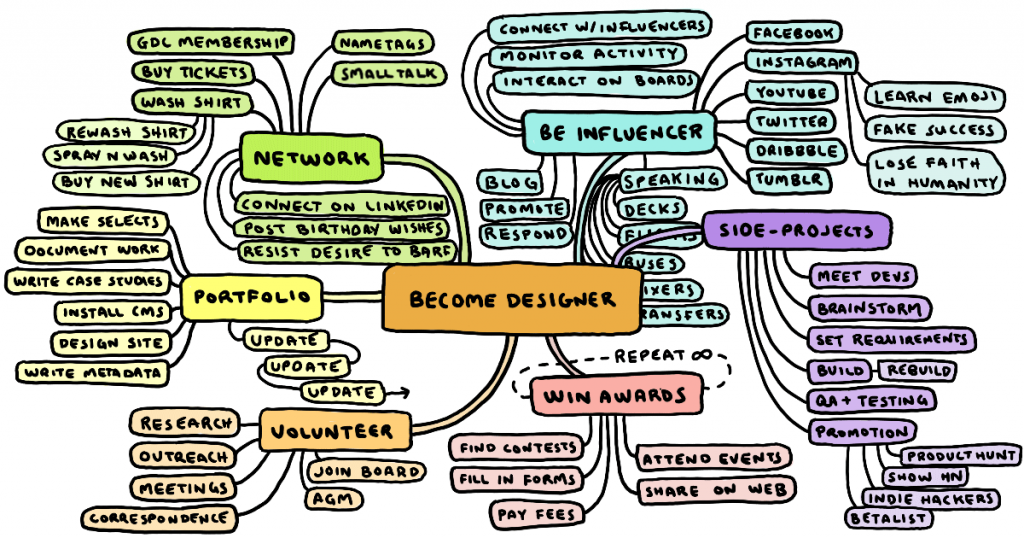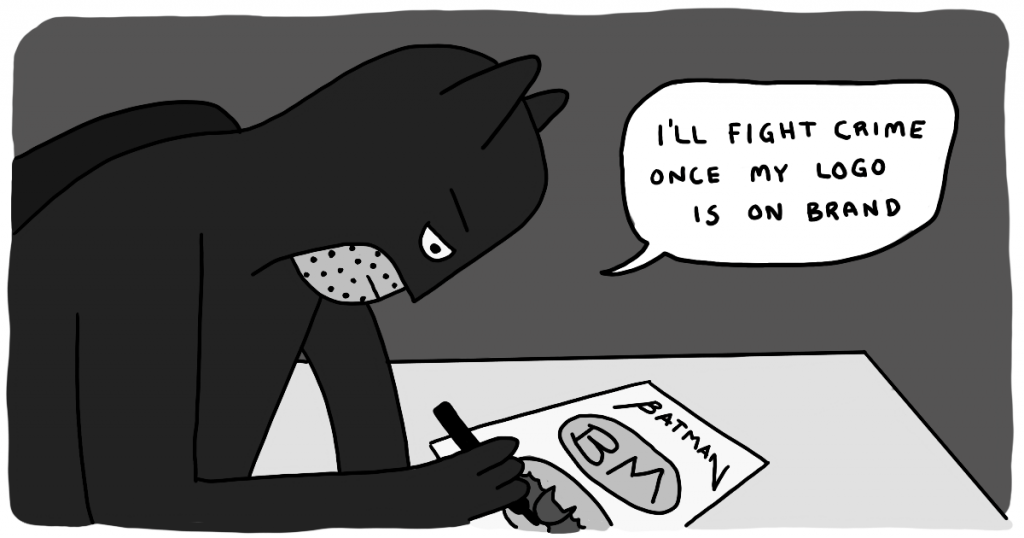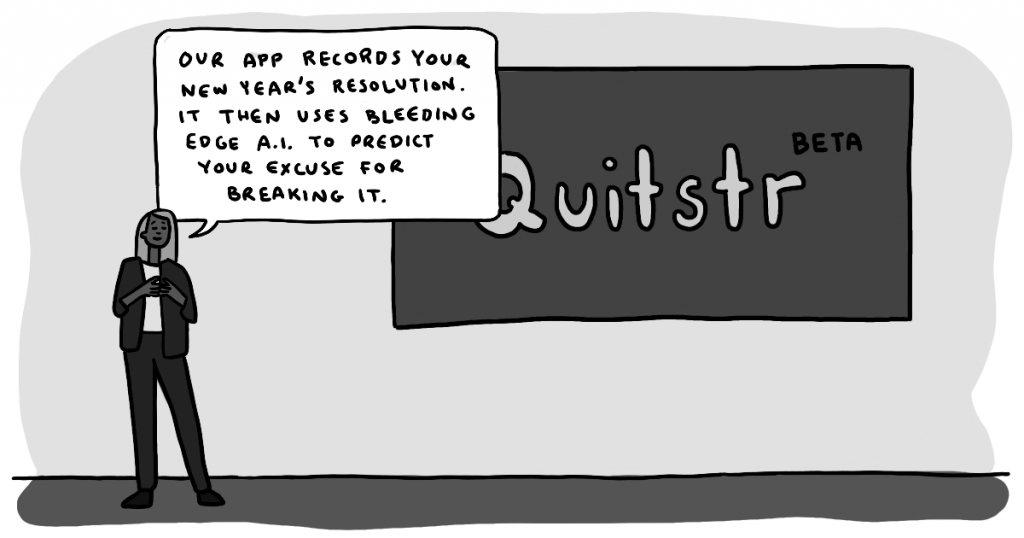Simple, but Hard
TL;DR: The solutions to many problems are simple. That doesn’t make them easy to act on, though.

I’m fat. I hate that word. I hate how some think it’s OK to comment on others’ weight. I hate that Homer Simpson and I share the same silhouette. And, I hate that no matter how good I try to be, little seems to change.
Even so, BMI does not lie. Many of us struggle with our weight. We craft elaborate plans for taking it off. We set goals and imagine our successes. We find hope in new diets that we soon abandon. We create reasons for why we cannot change.
A pattern of overcomplication
From time to time, I help people work through problems (on Officehours). I enjoy lending a hand. I feel useful when I do. I also see my problems differently—by helping others with theirs.
I commonly talk to people who have a clear need, but take a convoluted approach to making it happen. For example, one fellow tells me how he wants to be a designer. He never designs anything; he just reads about design. Another needs a job, but instead figures he’ll start a company.
Business owners aren’t different. A freelancer who has no clients plans to attract them—by writing blog articles. A studio owner needs more work, so, she has her team redesign their company website.
Notice a pattern here? In each case, the person chooses an indirect path in order to solve a seemingly simple problem. Each of these approaches involves a lot of work, yet, none of them directly addresses their goals.

Solutions can be simple
In each of these conversations, I offer suggestions. These suggestions will not surprise you. My response typically starts with: “I know what you’re thinking, and I’ve done the same, but…”
I asked the aspiring designer to put down his books, and instead design things. You can only gain so much from observing others. To become a designer you must practice your craft (even if the initial results are lousy).
I asked the designer to apply for jobs. Starting a business is a bigger commitment—and brings complications.1 There are lots of jobs out there. Securing employment is way easier than starting a company, finding clients, dealing with payroll, hiring staff, et cetera.
I asked the freelancer to meet with agencies, and forget about blogging. Agencies are always looking for new talent. They’ll hire you for your work, not your blog posts. (That said, it never hurts to practice your writing.)
And I asked the agency owner to leave her website alone and instead make sales calls. Their site was good enough. Besides, many prospective customers won’t even look at your website. Instead, meet with buyers, and find out what ails them.
Most times I receive the same response: “That’s great advice… but we’re still going to do what we planned.“ And I completely understand.

There’s comfort in avoidance
I understand because I once thought I should eat 6 – 12 eggs, in one sitting. I should probably explain.
When I was 17, I really, really, really wanted to meet a woman. You know… like one that would even talk to me? I felt unworthy, though, and couldn’t imagine anyone wanting to be with lowly me.
So, I took guidance from TV. TV told me that nothing appeals to women like brawn. I decided to go to the gym, and get some muscles. Before that, I did research. I bought a stack of worn Muscle and Fitness magazines. From them, I learned that the gym was only one part of the equation. I also needed to eat protein powder, and lots of eggs.
I never became a bodybuilder. I also didn’t meet any women. This is mostly because I didn’t talk to any women.
Around the same time, I got a summer sales job. It required me to walk from one business to the next, asking them to try our bottled water. Within 2 weeks, I placed more water coolers than my boss had in stock. He later told me, “If you just spoke to women, the way you talk to customers, you’d probably get a date.”

I didn’t date anyone for years. Instead, I reasoned that I first needed to be a great artist… or rich… or a famous something-or-other. I always had some elaborate plan for what had to happen before I did what needed doing.
This is because I was willing to concoct the most outrageously convoluted plans, stories, and explanations—just to avoid the sting of rejection.
You aren’t special; neither is anyone else
So, we’ve reached the obvious—but hard—part of this blog post. I don’t even need to write the rest. You already know what I’m going to say. Nevertheless, I will—because not completing the article feels lazy.
Do you want to lose weight? Reduce the number of calories you consume and/or burn more calories through activity. If you do this, there is no way for you to not lose weight. (This is what I’m doing. It’s no fun, but it’s working—albeit slowly.)
Want a job? Search for jobs you’re capable of doing, and apply for them. You’ll mostly get rejections or hear silence. This isn’t a slight against you. It’s just that for every job that gets 100 applicants, 99 people won’t get the gig. It’s a simple numbers game. So, keep playing it until they turn in your favor.
Want to be informed? Warren Buffet (who seems to be reasonably well informed) tells you to read 500 pages every day. He explains, “That’s how knowledge works. It builds up, like compound interest. All of you can do it, but I guarantee not many of you will do it.”
None of these things are complicated. None of them require magic or superhuman feats. There’s nothing that makes you less able to do them than anyone else. But none of them are easy, either.

—
Homework
Determine what you want to achieve. (For now, you should choose just one goal.2) Identify the most direct action for making this a reality. For example: If you want a job, your action is to apply for jobs. (Don’t get any more complicated than that.)
Then buy a wall calendar. Every day that you complete this action, you put a big green checkmark on that date.3 Every day that you don’t gets a red x. Get enough checkmarks, and you will achieve your goal.4
- I’m of the opinion that you should only start a business if you simply cannot work for someone else. For most people, a job offers greater freedom and more stability.
- This is because you’re trying to create a new habit. In my experience, it’s difficult to successfully integrate more than one new habit at a time.
- Not seeing results? Don’t get fancy. Instead, adjust the quantity of actions you take. Apply for more jobs. Avoid eating in the evening, to throttle calorie intake further. Request more meetings.
- Admittedly, this has limits. Responding to a thousand CEO postings, when you’re just out of college, probably won’t get you anywhere. That said, most people’s goals are achievable—making them a numbers game.
I’m @karj and the above is just my opinion. Looking for more? Here’s a full list of articles and information on my books. This is what I’m doing now, and what I don’t do. I’d love it if you tried Emetti on your website!